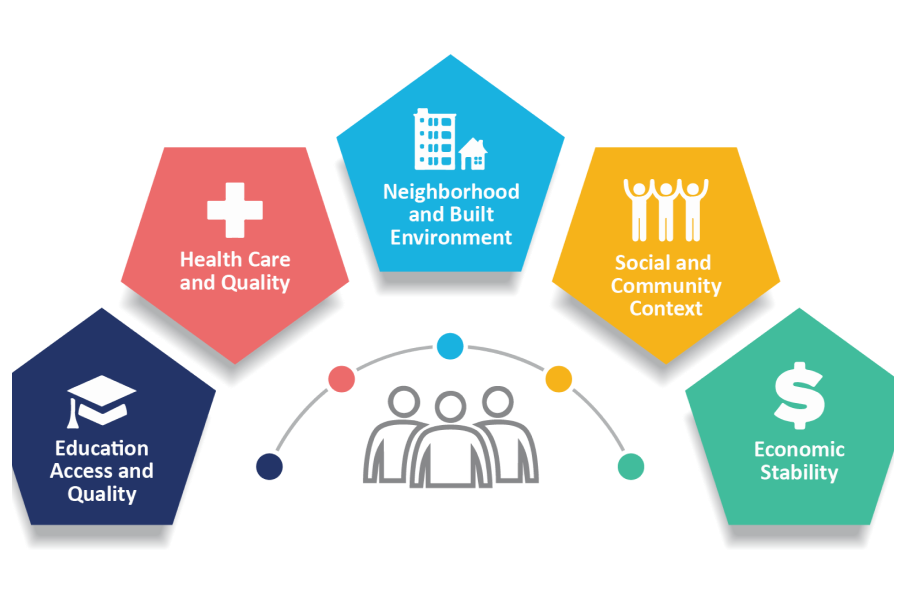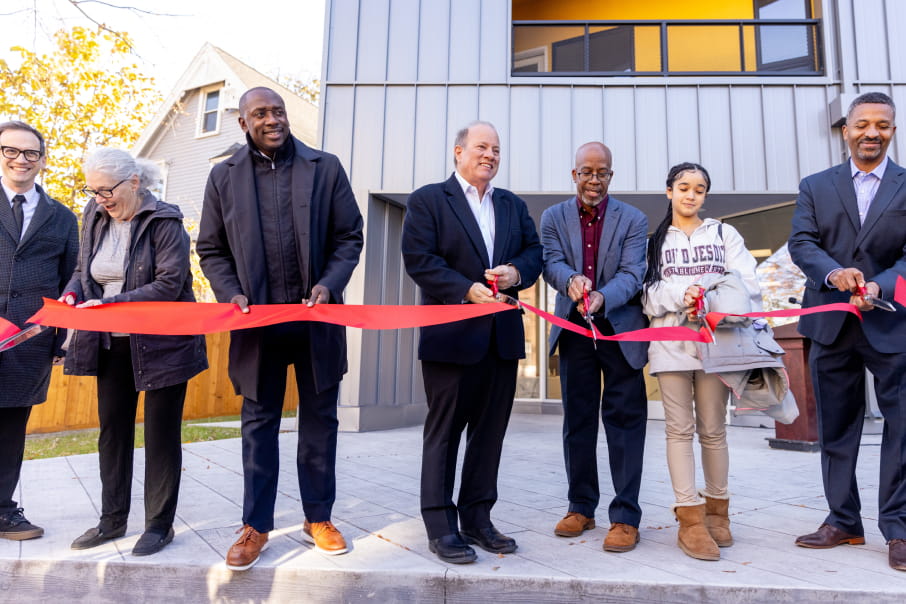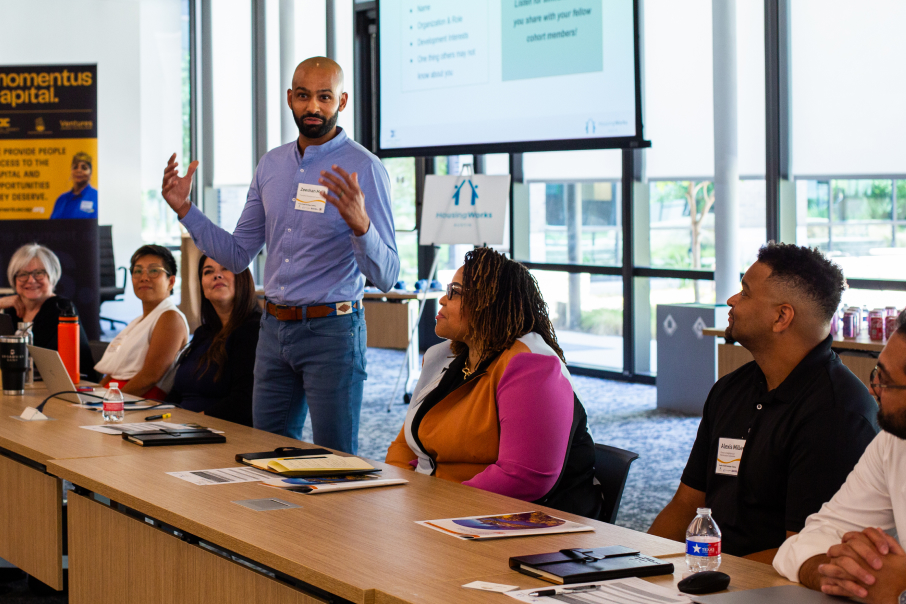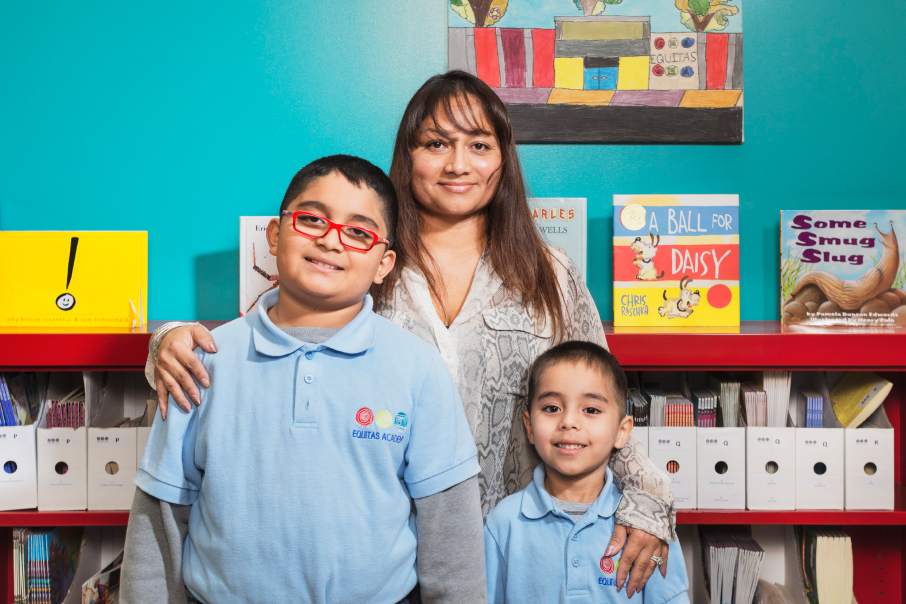At Momentus Capital, we know that to maximize our impact, we need to first understand it. Building and sustaining strong communities requires capital and resources – but without measuring outcomes, it’s impossible to develop effective interventions at scale.
That’s why we’ve developed a comprehensive Impact Framework to help us track the results of not only our loan offerings but also the capacity-building programs, technical assistance, and tools that make up our continuum of capital (PDF).
This framework is at the center of our decision-making process as we work toward our mission of helping to build strong communities by providing people access to the capital and opportunities they deserve.
So, what are we measuring, and why?
Measuring Results, Inferring Impact
At Momentus Capital, social impact refers to the changes that borrowers, communities, and other stakeholders experience or create through our partnership. Because these long-term changes can be difficult to quantify, our Impact Framework focuses on measuring the short-term and intermediate results that can be directly attributed to the financial, knowledge, and social capital we offer. We then use rigorous third-party research to infer how those results can lead to long-term social impacts.
We refer to the quantitative metrics and key performance indicators that we use to measure results as Impact Data. These numbers include:
- Loan volume
- Number of businesses supported
- Number of jobs created and retained as a result of every loan we originate
- Percentage of our lending that takes place in target communities
- Units of affordable housing built and maintained with our support
- Patients with expanded access to health care through our programs
- Customers with new access to healthy food
- Students enrolled in charter schools we support
We use these numbers in combination with third-party research to extrapolate likely impacts on individuals and communities. For example, suppose we know that the developers we support have built several hundred new affordable housing units in a city and increased the housing supply by a meaningful percentage. In that case, we can infer a long-term impact of increased housing stability, which in turn supports physical health, especially for children. Similarly, if supporting businesses leads to measurable minority-owned business growth and job creation, we can infer that our efforts are moving the needle toward a narrowed wealth gap.
Prioritizing a Place-Based Approach
The factors that drive the health and financial stability of communities are inherently interconnected, which means that investments in one area, like housing, can amplify the impacts of investment in another, such as education. Instead of spreading limited resources over large geographies, Momentus uses a place-based strategy that focuses investments in specific areas to create substantive change. This strategy also allows us to measure change more effectively and holistically.
Currently, our investments are concentrated in Detroit, the Washington, D.C. metro region, Los Angeles, and Dallas/Fort Worth, with emerging work in Atlanta and Miami. Our long-term commitment to these areas has allowed us to build strong partnerships and remain highly responsive to what each community needs and wants. It also allows us to measure outcomes more effectively and over longer periods.

Understanding the Social Determinants of Health
To make those extrapolations and understand how the capital and opportunities we provide are improving the health and well-being of the communities we serve, we use an impact measurement approach built on the Social Determinants of Health (SDOH).
Social determinants of health are the conditions in which people are born, live, and work that affect health outcomes. They include everything from socioeconomic status and educational opportunities to access to healthy food. Extensive research demonstrates that these factors, which often interact with and compound one another, significantly impact individuals’ ability to live healthy, fulfilling, and productive lives. The United Nations’ Sustainable Development Goals are also closely aligned with SDOH.
To measure our impact, we monitor and collect data across six domains of the SDOH. They are:
Economic Security
Without economic stability, it’s impossible for individuals and families to sustainably access other social determinants of health. Yet stable employment and household wealth — the building blocks of financial stability — remain out of reach for many.
Momentus helps our borrowers earn steady incomes and build wealth by broadening access to financial resources. Since small businesses create two-thirds of new jobs in the United States, offering entrepreneurs and developers access to financial, knowledge, and social capital can have powerful ripple effects that build economic security across communities.
Our Impact
- $20 billion in small business financing deployed since 1978
- More than 11,000 businesses supported
- Nearly 250,000 jobs created
- Nearly 130,000 jobs retained

Neighborhood and Housing
Safe and affordable housing is a crucial cornerstone for any individual or family’s life. Without it, accessing education, employment, and other resources is difficult. In the United States, a widespread shortage of safe and affordable housing is tied to a number of negative health outcomes.
Momentus has responded to this challenge with extensive investments in high-quality, affordable housing development. In addition, we run several programs to train and support real estate developers of color dedicated to improving housing.
Our Impact
- $455 million invested in housing projects since 1981
- Capacity building through our real estate developer training programs: Growing Housing Developers (GHD), HEAF, and EDI.
Health Care
Access to a full range of health care services is essential for not treating disease but for promoting good quality of life. Over a third of U.S. residents live in counties with significant health care service gaps, and one in ten people lack health insurance.
Momentus invests in health care projects and infrastructure ranging from small clinics to major hospitals in communities that lack health services. Our goal with these investments is to increase access to comprehensive, high-quality treatment and preventive care.
Our Impact
- $850 million invested in health care projects since 1981
Education
Education can unlock economic opportunities, strengthen community ties, and support the development of healthy, engaged citizens. However, in the United States, public education quality varies significantly.
Momentus supports charter schools and early education businesses to ensure that all children, regardless of where they live, have access to quality education. Since a child’s earliest years are crucial to their development, we also invest in early education centers.
Our Impact
- Nearly $1 billion lent to schools and early education centers
Healthy Food
Without consistent access to healthy food, individuals and families struggle to remain healthy and productive. Currently, 54 million Americans are food insecure, and 23.5 million live in food deserts, meaning they must travel more than a mile to reach a supermarket.
Momentus provides loans to grocery stores and food retailers in underserved areas to expand access to healthy food in communities that previously had few options.We also support food businesses with grants and technical assistance through our Nourish DC initiative.
Our Impact
- Over $900K granted to food businesses in the Washington, DC metro area since 2022
- $195 million lent to food businesses, reaching two million customers
Social and Community Context
Research shows that people are mentally and physically healthier when they feel a strong sense of community belonging. In some cases, positive community relationships can even lessen the negative mental health impacts of poor physical conditions in neighborhoods. However, if individuals lack access to other domains, such as stable housing, employment, education, and health care in their communities, it’s much harder to build and maintain local ties.
Through our place-based strategy, Momentus helps communities increase access to services essential to strong communities, like high-quality schools and health care facilities. Further, our investments in small local businesses help support community health by increasing productivity and employment and facilitating touchpoints between neighbors.

How We Use Our Data
Since much of our work involves direct financial support, we have access to extensive data sets from the loan application and closing process as well as reporting throughout the life of each loan. Plus, since our unique continuum of capital approach pairs monetary investment with advisory support, we have numerous touchpoints with our program participants.
We recognize the value of this data and aim to use it as effectively as possible while respecting the privacy and security of our partners.
External Uses
We also use our data externally to help scale our impact. We share anonymized information with government, non-profit, and private-sector partners to maintain accountability and share our learnings. We also use impact data and our participants’ personal stories (with their consent) to advocate for policies that promote financial equity at the federal, state, and local levels. Finally, we publish an Annual Report to highlight our successes and share what we’ve learned.
Internal Uses
The Momentus team uses data daily to refine our program offerings and models and remain responsive to our participants. For example, Momentus recently offered over $900,000 in grants through Nourish DC to Washington, D.C., food businesses. During the grantmaking process, our proactive analysis of the applications revealed that many businesses needed cold storage solutions, so we developed an additional grant for cooling systems.
Working Toward a More Equitable Future
Our impact measurement work helps Momentus develop highly effective solutions and ensure that every dollar we invest supports the health and wealth building of individuals and communities. It gives us actionable data that we can share with partner organizations and the government, and it helps us move closer to our vision of an economic system that respects and uplifts all peoples’ right to achieve the dreams they have for themselves, their communities, and generations to come.




